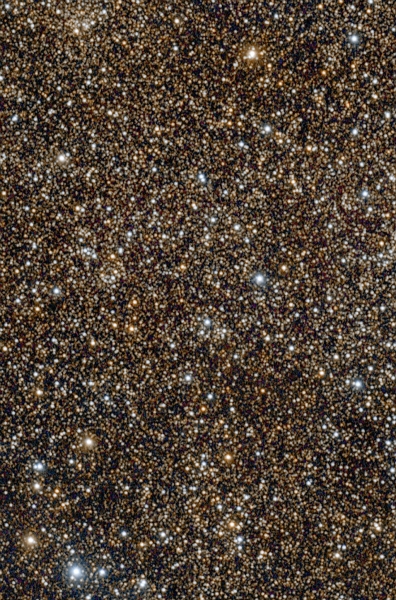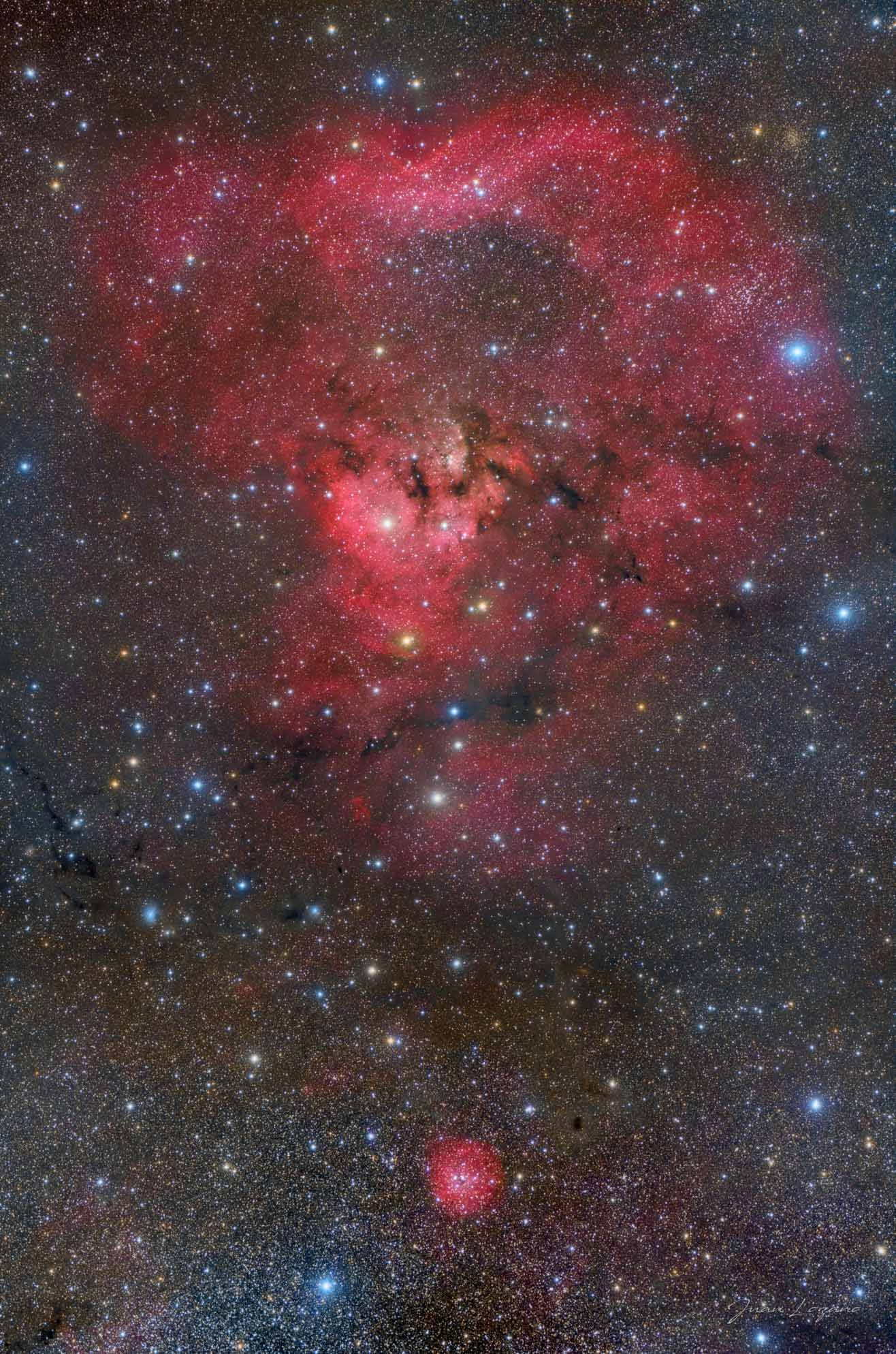Submissions: 2021 November
Re: Submissions: 2021 November
The Pillars of Darkness
Click to view full size image: Higher Resolution on Flickr
Copyright: Brent Newton
This is the Barnard 22 region shot under Bortle 1 skies of the 2021 Okie-Tex Star Party in Western Oklahoma. I spent 6 nights in total shooting once it had risen high enough, primarily focusing on Luminance, though the transparency conditions were mediocre to poor most the week so out of 26 hours total I only used about 16. I found the shape of this nebula reminiscent of M16's Pillars of Creation, leading to my contrasting title, though when viewing the image upside-down I can also see a shape resembling Sauron's fortress of Barad-dûr. One curiosity I found was 6 small smudges evenly placed in the corner of the stacked images (which were carefully clone stamped out), indicating a slow-moving object - after querying a JPL site I found that 322 Phaeo, a 70km-wide asteroid discovered in 1891, was moving through the area during the star party (see Annotated image link below)
William Optics Star71-II Petzval APO (344mm f/4.9)
ZWO ASI1600MM-P shot using Gain 76, 1x1 binning, -10C
Lum: 316x120", Red: 62x120", Green: 56x120", Blue: 64x120", compiled and processed in PixInsight
Annotations available via this page on Astrobin
Click to view full size image: Higher Resolution on Flickr
Copyright: Brent Newton
This is the Barnard 22 region shot under Bortle 1 skies of the 2021 Okie-Tex Star Party in Western Oklahoma. I spent 6 nights in total shooting once it had risen high enough, primarily focusing on Luminance, though the transparency conditions were mediocre to poor most the week so out of 26 hours total I only used about 16. I found the shape of this nebula reminiscent of M16's Pillars of Creation, leading to my contrasting title, though when viewing the image upside-down I can also see a shape resembling Sauron's fortress of Barad-dûr. One curiosity I found was 6 small smudges evenly placed in the corner of the stacked images (which were carefully clone stamped out), indicating a slow-moving object - after querying a JPL site I found that 322 Phaeo, a 70km-wide asteroid discovered in 1891, was moving through the area during the star party (see Annotated image link below)
William Optics Star71-II Petzval APO (344mm f/4.9)
ZWO ASI1600MM-P shot using Gain 76, 1x1 binning, -10C
Lum: 316x120", Red: 62x120", Green: 56x120", Blue: 64x120", compiled and processed in PixInsight
Annotations available via this page on Astrobin
-
Iaffaldano Giuseppe Carmine
- Ensign
- Posts: 54
- Joined: Sun Jun 18, 2017 10:13 am
- Location: TARANTO
Re: Submissions: 2021 November
An Heart and a Soul togheter : IC 1805 & IC 1848
 an Heart and a Soul togheter - IC 1805 + IC 1848 by gc.iaffaldano, su Flickr
an Heart and a Soul togheter - IC 1805 + IC 1848 by gc.iaffaldano, su Flickr
Copyright Iaffaldano G.C.
 an Heart and a Soul togheter - IC 1805 + IC 1848 by gc.iaffaldano, su Flickr
an Heart and a Soul togheter - IC 1805 + IC 1848 by gc.iaffaldano, su FlickrCopyright Iaffaldano G.C.
-
andreigusan
- Ensign
- Posts: 10
- Joined: Sun Jul 05, 2020 7:56 pm
Re: Submissions: 2021 November

IC1396 - Elephant's Trunk Nebula
8 hours in SHO
Telescope: TS-Photon 10" f/4 Newtonian @ 1016mm focal length with 1x GPU coma corrector
Camera: ASI294MM Pro Bin2
Filters: Astronomik Ha, S2, OIII 6nm
Mount: iOptron CEM70-NUC
Guided with RedCat51 and ASI290MM mini
More details here: https://www.astrobin.com/csxqp7/
IC 1848
Hello friends.
This is our last job.
35x600" Halfa
25x600" Hbeta
25x600" OIII
25x600" SII
50x400" RGB
We hope you like it
Copyrights :Raul Villaverde, Domingo Pestana and Nicolas Romo
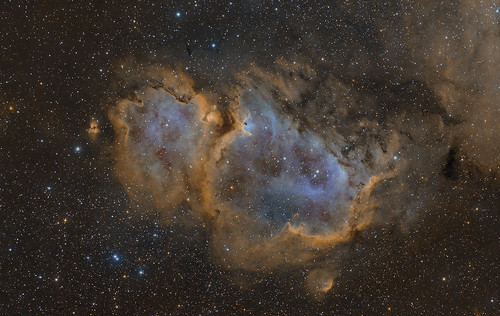 IC1848_2021_TOTAL_FINAL by Raul Villaverde, en Flickr
IC1848_2021_TOTAL_FINAL by Raul Villaverde, en Flickr
This is our last job.
35x600" Halfa
25x600" Hbeta
25x600" OIII
25x600" SII
50x400" RGB
We hope you like it
Copyrights :Raul Villaverde, Domingo Pestana and Nicolas Romo
 IC1848_2021_TOTAL_FINAL by Raul Villaverde, en Flickr
IC1848_2021_TOTAL_FINAL by Raul Villaverde, en Flickr- the_astronomy_enthusiast
- Ensign
- Posts: 98
- Joined: Fri Apr 16, 2021 10:16 pm
- Contact:
Re: Submissions: 2021 November
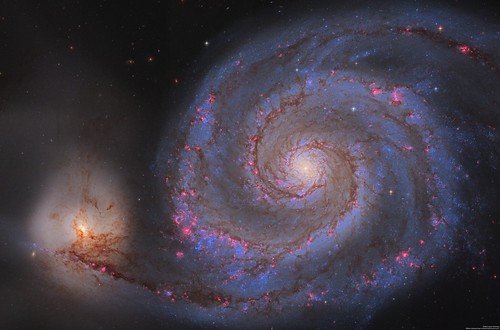
Messier 51 from Hubble by William Ostling, on Flickr
The graceful, winding arms of the majestic whirlpool galaxy appear like a grand spiral staircase sweeping through space. They are actually long lanes of stars and gas laced with dust.
This sharpest-ever image of the Whirlpool Galaxy illustrates a spiral galaxy’s grand design, from its curving spiral arms, where young stars reside, to its yellowish central core, a home of older stars. The bright pink regions display large bursts of H-alpha, where new stars are formed.
I would highly recommend viewing this image on gigapan, where you can zoom in to the full resolution. http://www.gigapan.com/gigapans/227620
Full write up on this image can be viewed here: https://theastroenthusiast.com/messier-51-from-hubble/
-
KuriousGeorge
- Science Officer
- Posts: 218
- Joined: Wed Dec 30, 2015 7:07 am
- Location: San Diego, CA
- Contact:
Re: Submissions: 2021 November
NGC 660. KG Observatory, Julian, CA.
"NGC 660 is a peculiar and unique polar-ring galaxy located approximately 45 million light-years from Earth in the Pisces constellation. It is the only such galaxy having, as its host, a "late-type lenticular galaxy".It was probably formed when two galaxies collided a billion years ago. However, it may have first started as a disk galaxy that captured matter from a passing galaxy. This material could have, over time, become "strung out" to form a rotating ring.
The ring is not actually polar, but rather has an inclination from the plane of the host disk of approximately 45 degrees. The extreme number of pinkish star-forming areas that occurs along the galaxy's ring could be the result of the gravitation interaction caused by this collision. The ring is 50,000 light-years across - much broader than the disk itself - and has a greater amount of gas and star formation than the host ring. This likely indicates a very violent formation. The polar ring contains objects numbering in the hundreds. Many of these are red and blue supergiant stars. The most recently created stars in the ring were just formed approximately 7 million years ago. This indicates that the formation of these stars has been a long process and is still occurring.
Data about the dark matter halo of NGC 660 can be extracted by observing the gravitational effects of the dark matter on the disk and ring's rotation.From the core of the disk, radio waves are being emitted. The source of these waves is an area only 21 light-years across. This may indicate the presence of a super-cluster of stars located within an area of cloud of gas. The region in the centre has a vast amount of star formation, so luminous that it is considered to be a starburst galaxy.
Late in 2012, this polar-ring galaxy produced an enormous outburst having a magnitude of approximately ten times brighter than a supernova explosion. The cause is not certain, but this event may have resulted from a tremendous jet being emanating from galaxy's central black hole."
https://www.astrobin.com/pti0ig/
"NGC 660 is a peculiar and unique polar-ring galaxy located approximately 45 million light-years from Earth in the Pisces constellation. It is the only such galaxy having, as its host, a "late-type lenticular galaxy".It was probably formed when two galaxies collided a billion years ago. However, it may have first started as a disk galaxy that captured matter from a passing galaxy. This material could have, over time, become "strung out" to form a rotating ring.
The ring is not actually polar, but rather has an inclination from the plane of the host disk of approximately 45 degrees. The extreme number of pinkish star-forming areas that occurs along the galaxy's ring could be the result of the gravitation interaction caused by this collision. The ring is 50,000 light-years across - much broader than the disk itself - and has a greater amount of gas and star formation than the host ring. This likely indicates a very violent formation. The polar ring contains objects numbering in the hundreds. Many of these are red and blue supergiant stars. The most recently created stars in the ring were just formed approximately 7 million years ago. This indicates that the formation of these stars has been a long process and is still occurring.
Data about the dark matter halo of NGC 660 can be extracted by observing the gravitational effects of the dark matter on the disk and ring's rotation.From the core of the disk, radio waves are being emitted. The source of these waves is an area only 21 light-years across. This may indicate the presence of a super-cluster of stars located within an area of cloud of gas. The region in the centre has a vast amount of star formation, so luminous that it is considered to be a starburst galaxy.
Late in 2012, this polar-ring galaxy produced an enormous outburst having a magnitude of approximately ten times brighter than a supernova explosion. The cause is not certain, but this event may have resulted from a tremendous jet being emanating from galaxy's central black hole."
https://www.astrobin.com/pti0ig/
-
phoenix_sk
- Asternaut
- Posts: 1
- Joined: Mon Nov 08, 2021 7:03 pm
Re: Submissions: 2021 November
The silence spreading along the front lines on 11th of November 1918 marked the end of the bloodiest conflict mankind saw up until that point. Millions were not lucky enough to witness the end of 4 years of hell. My image honors them all.
More than 8500 Austro-Hungarian and Russian soldiers are lying in their eternal rest near the village of Veľkrop, in the largest WW1 cemetery in Slovakia. Nature paints a beautiful scenery for the men, who knew so little peace and quiet in their final days.
More than 8500 Austro-Hungarian and Russian soldiers are lying in their eternal rest near the village of Veľkrop, in the largest WW1 cemetery in Slovakia. Nature paints a beautiful scenery for the men, who knew so little peace and quiet in their final days.
- PierandreaFolle
- Ensign
- Posts: 23
- Joined: Thu Mar 05, 2020 4:16 pm
Re: Submissions: 2021 November
Space Valley
My camera decided to shoot this tree all night long. That's what happened! Heart's movement make a little trail in the stars, recorded by the sensor. The sum of 305 shot, each one of 47 seconds, made this kind of effect, a Startrail.
I shoot from 00:30 till dawn at 4:30am.
After a long night shooting milky way, I really want to shoot this startrail and I found quickly this spot, because I was really tired. We are in Pollino National Park, on peak Serra Di Crispo, 2050m above sea. This tipical tree, Pino Loricato, was looking the valley of Piani del Pollino for many many centuries!
After the shooting started, I came back to my tent near the spot for enjoy a really cold night. All my friends are sleeping so.. Shh!
-----
SKY EXIF
305x47s | f/3.5 | ISO 800
FOREGROUND EXIF
2x268s | f/5.6 | ISO 1250
Copyright: Pierandrea Folle
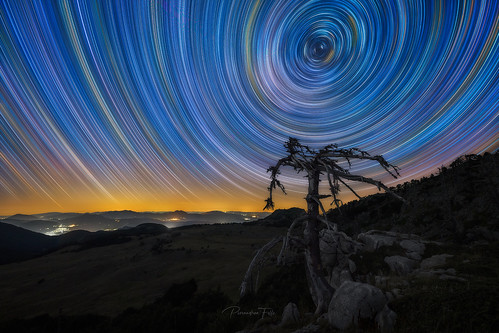 Space Valley by Pierandrea Folle, su Flickr
Space Valley by Pierandrea Folle, su Flickr
My camera decided to shoot this tree all night long. That's what happened! Heart's movement make a little trail in the stars, recorded by the sensor. The sum of 305 shot, each one of 47 seconds, made this kind of effect, a Startrail.
I shoot from 00:30 till dawn at 4:30am.
After a long night shooting milky way, I really want to shoot this startrail and I found quickly this spot, because I was really tired. We are in Pollino National Park, on peak Serra Di Crispo, 2050m above sea. This tipical tree, Pino Loricato, was looking the valley of Piani del Pollino for many many centuries!
After the shooting started, I came back to my tent near the spot for enjoy a really cold night. All my friends are sleeping so.. Shh!
-----
SKY EXIF
305x47s | f/3.5 | ISO 800
FOREGROUND EXIF
2x268s | f/5.6 | ISO 1250
Copyright: Pierandrea Folle
 Space Valley by Pierandrea Folle, su Flickr
Space Valley by Pierandrea Folle, su FlickrRe: Submissions: 2021 November
Comet Leonard (C/2021 A1)
November 8, 2021
Comet centered on 10:19 UT
LRGB
Nick Pavelchak
https://www.astrobin.com/ogg736/
November 8, 2021
Comet centered on 10:19 UT
LRGB
Nick Pavelchak
https://www.astrobin.com/ogg736/
-
Astrodude13
- Ensign
- Posts: 36
- Joined: Sun Jan 19, 2014 11:44 pm
Re: Submissions: 2021 November
This is my best Orion Nebula yet!
 Orion Nebula 2021 by Blake Estes, on Flickr
Orion Nebula 2021 by Blake Estes, on Flickr
Planewave CDK20
Planewave A200HR
SBIG STX-16803
Astrodon LRGB Filters
Luminance used only for Trapezium
27hrs 42.53 minutes total exposure time
Siding Spring Observatory, Australia
27hrs
55x600s Red
55x600s Green
55x600s Blue
36 Minutes for outer core
6x120s Red
6x120s Green
6x120s Blue
6.53 Minutes for Trapezium
98x1s Luminance
98x1s Red
98x1s Green
98x1s Blue
Minor glare removed from top right corner
 Orion Nebula 2021 by Blake Estes, on Flickr
Orion Nebula 2021 by Blake Estes, on FlickrPlanewave CDK20
Planewave A200HR
SBIG STX-16803
Astrodon LRGB Filters
Luminance used only for Trapezium
27hrs 42.53 minutes total exposure time
Siding Spring Observatory, Australia
27hrs
55x600s Red
55x600s Green
55x600s Blue
36 Minutes for outer core
6x120s Red
6x120s Green
6x120s Blue
6.53 Minutes for Trapezium
98x1s Luminance
98x1s Red
98x1s Green
98x1s Blue
Minor glare removed from top right corner
Witch Head
30 shots at 600 seconds each of NGC 1909 shot the night of November 7th from my backyard with a ZWO ASI2600MC camera, William Optics GT81 telescope, and Losmandy GM811G equatorial mount.
Re: Submissions: 2021 November
Milky Way Arch over Swiss Star Party 2021
https://sternklar.ch/images-webpages/Fo ... y-2021.htm
The Swiss Star Party was nominated as one of the Top Ten Star Parties of this world by BBC Sky at Night Magazine: http://www.teleskoptreffen.ch/starparty/
In 2021, to the delight of the participants, the Sky was exceptionally clear.
Exposure data:
Panorama consisting of 6 frames with Canon EOS Ra and Canon RF 15-35mm f/2.8 L @ f/2.8. Exposure time: 6 x 22 sec @ 6400 Asa, unguided. Gurnigelpass, Switzerland,1600 m.a.s.l., Sept. 4, 2021.
Copyright: Manuel Jung, www.sternklar.ch
https://sternklar.ch/images-webpages/Fo ... y-2021.htm
The Swiss Star Party was nominated as one of the Top Ten Star Parties of this world by BBC Sky at Night Magazine: http://www.teleskoptreffen.ch/starparty/
In 2021, to the delight of the participants, the Sky was exceptionally clear.
Exposure data:
Panorama consisting of 6 frames with Canon EOS Ra and Canon RF 15-35mm f/2.8 L @ f/2.8. Exposure time: 6 x 22 sec @ 6400 Asa, unguided. Gurnigelpass, Switzerland,1600 m.a.s.l., Sept. 4, 2021.
Copyright: Manuel Jung, www.sternklar.ch
Re: Submissions: 2021 November
Embryo Nebula - NGC 1333
IG: https://www.instagram.com/anas_almajed/
Twitter: https://twitter.com/Amajed172
Copyright: anas almajed
Full size image URL: https://www.astrobin.com/hzk6ko/
IG: https://www.instagram.com/anas_almajed/
Twitter: https://twitter.com/Amajed172
Copyright: anas almajed
Full size image URL: https://www.astrobin.com/hzk6ko/
Re: Submissions: 2021 November
SH2-261 / Lower's nebula
Click on above to enlarge
Full info & high resolution @ https://www.kinchastro.com/sh2-261.html
Click on above to enlarge
Full info & high resolution @ https://www.kinchastro.com/sh2-261.html
-
KuriousGeorge
- Science Officer
- Posts: 218
- Joined: Wed Dec 30, 2015 7:07 am
- Location: San Diego, CA
- Contact:
Re: Submissions: 2021 November
M77. KG Observatory, Julian, CA.
Object 2 of 2 from my October/November dark cycle.
Here I used 5-minute L subs to help expose more of the very bright core. The spirals emminating from the core looked to be a bit stronger in the R channel. 45 minutes of screened Ha helped highlight that.
All processing uses 2x Drizzle to help increase resolution for a narrow shot. (-:
"Initially identified as a nebula by the French astronomer Pierre Méchain in 1780, M77 is one of the largest galaxies in the Messier catalog. It is located in the constellation Cetus at a distance of 45 million light-years from Earth.
M77 is a prime example of a Seyfert galaxy, or a galaxy with an intensely active center that is obscured by gas and dust in visible light.
Only one supernova has been detected in Messier 77. The supernova, named SN 2018ivc, was discovered on 24 November 2018 by the DLT40 Survey."
https://www.astrobin.com/ltspzs/
Object 2 of 2 from my October/November dark cycle.
Here I used 5-minute L subs to help expose more of the very bright core. The spirals emminating from the core looked to be a bit stronger in the R channel. 45 minutes of screened Ha helped highlight that.
All processing uses 2x Drizzle to help increase resolution for a narrow shot. (-:
"Initially identified as a nebula by the French astronomer Pierre Méchain in 1780, M77 is one of the largest galaxies in the Messier catalog. It is located in the constellation Cetus at a distance of 45 million light-years from Earth.
M77 is a prime example of a Seyfert galaxy, or a galaxy with an intensely active center that is obscured by gas and dust in visible light.
Only one supernova has been detected in Messier 77. The supernova, named SN 2018ivc, was discovered on 24 November 2018 by the DLT40 Survey."
https://www.astrobin.com/ltspzs/
-
Prof Parker
Re: Submissions: 2021 November
The Stars Like Dust. The Milky Way near the star Caph in Cassiopeia.
Re: Submissions: 2021 November
Mohamed, this is your first post here and it looks great! Welcome to Starship Asterisk*!Mohamedusama19 wrote: ↑Tue Nov 02, 2021 1:14 pm Rho Ophiuchi Cloud Complex
https://www.astrobin.com/nos0uv/
Copyright: Mohamed Usama Ismail / Ursamo Astrophotography
Traveling through the valleys of Saint Catherine at day and capturing the majestic Rho Ophiuchi cloud complex at night was my routine in the last few nights.
I was lucky getting few of them while capturing the beautiful bortle 1 night sky of Egypt. This image was shot using my beloved portable setup with no complications just a tracker, stock dslr, 135mm lens, and most importantly patience.
Location: Dar Eid - Saini - Egypt.
Date: August 11/12/13.
https://cdn.astrobin.com/thumbs/rLfJcEJ ... fEjbCE.jpg
Ann
Color Commentator
Re: Submissions: 2021 November
I always look forward to your images, and you never disappoint!KuriousGeorge wrote: ↑Wed Nov 10, 2021 1:19 am M77. KG Observatory, Julian, CA.
Object 2 of 2 from my October/November dark cycle.
Here I used 5-minute L subs to help expose more of the very bright core. The spirals emminating from the core looked to be a bit stronger in the R channel. 45 minutes of screened Ha helped highlight that.
All processing uses 2x Drizzle to help increase resolution for a narrow shot. (-:
"Initially identified as a nebula by the French astronomer Pierre Méchain in 1780, M77 is one of the largest galaxies in the Messier catalog. It is located in the constellation Cetus at a distance of 45 million light-years from Earth.
M77 is a prime example of a Seyfert galaxy, or a galaxy with an intensely active center that is obscured by gas and dust in visible light.
Only one supernova has been detected in Messier 77. The supernova, named SN 2018ivc, was discovered on 24 November 2018 by the DLT40 Survey."
https://www.astrobin.com/ltspzs/
That's a great portrait of M77! I love the fact that you bring out so much of the outer faint parts of M77. If you compare it with a NASA/ESA image, it only shows the bright inner spiral of M77. And those that show as much of the outer parts of the galaxy as your image does overexpose the bright inner bulge more than you do. In short, this is a superb image!
Ann
Color Commentator
-
Prof Parker
Re: Submissions: 2021 November
The stars like dust. This is a zoom-in the Milky Way region near Caph in Cassiopeia. Image taken on 2 x Canon 200mm lenses. Usually pictures of the Milky Way look like beautiful cloud-like structures. I have not seen a close-up like this before where you can see just how many stars are packed together.
-
aignerastro
- Asternaut
- Posts: 7
- Joined: Wed Apr 21, 2021 11:53 pm
Re: Submissions: 2021 November
https://i.imgur.com/sGbTLPa.png
Coronal Loops blasting off the suns surface! Shot with my Meade 115mm / Daystar Quark
Last edited by bystander on Thu Nov 11, 2021 12:09 am, edited 2 times in total.
Reason: Please, no hot links to images > 500 kb. Uploaded as an attachment.
Reason: Please, no hot links to images > 500 kb. Uploaded as an attachment.
-
aignerastro
- Asternaut
- Posts: 7
- Joined: Wed Apr 21, 2021 11:53 pm
Re: Submissions: 2021 November

Coronal Loops - shot 11/9/21 with Meade 115mm and Daystar Quark w/ASI120mm-S
-
aignerastro
- Asternaut
- Posts: 7
- Joined: Wed Apr 21, 2021 11:53 pm
Re: Submissions: 2021 November
https://i.imgur.com/yFFH41d.png
Soul Nebula using a modified ForaXX palette. Shot with Meade 115mm/ZWO 294m
Last edited by bystander on Thu Nov 11, 2021 12:11 am, edited 2 times in total.
Reason: Please, no hot links to images > 500 kb. Uploaded as an attachment.
Reason: Please, no hot links to images > 500 kb. Uploaded as an attachment.
-
Juan Lozano
- Ensign
- Posts: 45
- Joined: Wed Feb 06, 2013 8:24 am
- Location: Elche (Alicante) Spain
- Contact:
Re: Submissions: 2021 November
Question mark nebula
http://observatorioelche.blogspot.com/2 ... ebula.html
Copyright: Juan Lozano de Haro
http://observatorioelche.blogspot.com/2 ... ebula.html
Copyright: Juan Lozano de Haro
-
astrojoetography
- Asternaut
- Posts: 8
- Joined: Wed Sep 08, 2021 6:28 pm
Re: Submissions: 2021 November
Crescent Nebula (NGC 6888) & the 'recently' discovered Soap Bubble Nebula (PN G75.5+1.7), floating in a sea of Hydrogen.
Full resolution:
https://astrob.in/full/55idn2/0/
 Integration Time: 33h 10'
Integration Time: 33h 10'
Image captured in August in Michigan
Photographer: Joe Schlaf
@astrojoetography
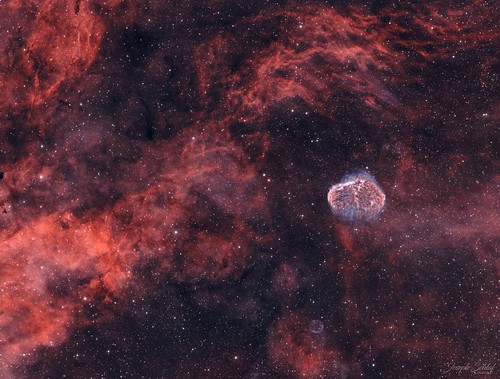 Crescent and Soap Bubble Nebulae by Joe Schlaf, on Flickr
Crescent and Soap Bubble Nebulae by Joe Schlaf, on Flickr
Full resolution:
https://astrob.in/full/55idn2/0/
Image captured in August in Michigan
Photographer: Joe Schlaf
@astrojoetography
 Crescent and Soap Bubble Nebulae by Joe Schlaf, on Flickr
Crescent and Soap Bubble Nebulae by Joe Schlaf, on Flickr-
RoiLevi
Re: Submissions: 2021 November
Pillars of Creation
the closest image we can take from earth that is similar to Hubble space telescope image of M16 nebula core the Pillars of Creation .
this image was captured with one of the best telescope Gear setups on planet earth
Scope :CDK 1000
Camera PL 16803
FL 6000 mm,
integration time 11 hours per channel. , Filters Chroma 3nnm.
ObsTech @ El Sauce, Chile
Copyrights: Processing Roi Levi/ Shooting Mike Selby
the closest image we can take from earth that is similar to Hubble space telescope image of M16 nebula core the Pillars of Creation .
this image was captured with one of the best telescope Gear setups on planet earth
Scope :CDK 1000
Camera PL 16803
FL 6000 mm,
integration time 11 hours per channel. , Filters Chroma 3nnm.
ObsTech @ El Sauce, Chile
Copyrights: Processing Roi Levi/ Shooting Mike Selby



